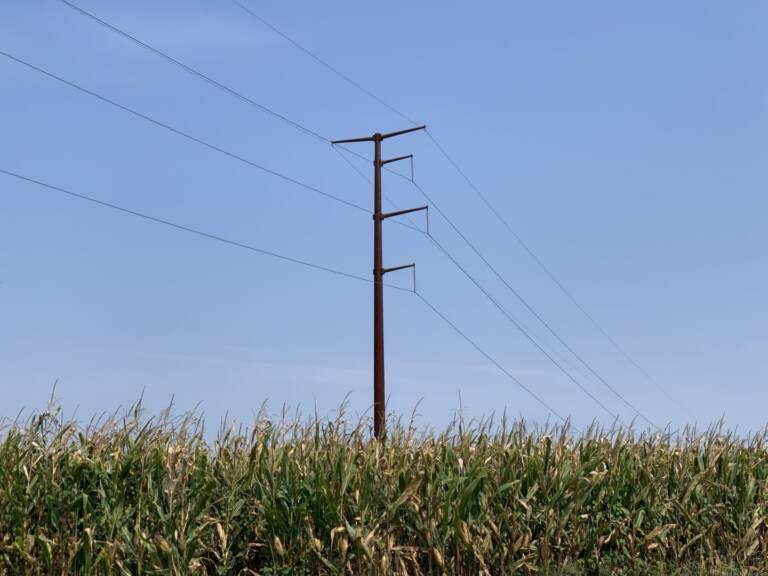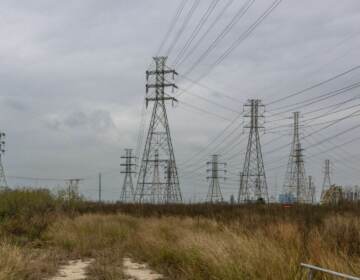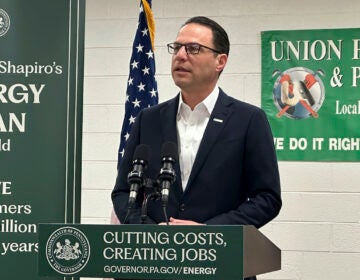Pa. lawmakers hear challenges to electric grid reliability; experts call for clear policy
State lawmakers are questioning electricity reliability after a winter storm around Christmas left more than 100,000 people without power.

A transmission line stands in a cornfield in Chanceford Township, York County on Sept. 13, 2021. (Rachel McDevitt / StateImpact Pennsylvania)
This story originally appeared on StateImpact Pennsylvania.
State lawmakers are questioning electricity reliability after a winter storm around Christmas left more than 100,000 people without power.
Meanwhile, electric grid operators are warning of an emerging trend that could cause more problems.
Winter Storm Elliot sent temperatures plunging nearly 30 degrees on Dec. 23, 2022, increasing electricity demand beyond what grid operators expected. Power plants struggled to respond in time.
Pennsylvania’s grid operator is PJM, which also coordinates power in 12 other states and Washington, D.C.
In the region, natural gas plants made up about 70% of the units that failed to respond when called up. Coal plants were responsible for 16%, and the remainder was a mix of solar, wind and nuclear.
Asim Haque, Vice President of State and Member Services at PJM, compared the event to putting together an intricate jigsaw puzzle.
“During a historic cold day with historic demand. And just when they think they’re found the right piece to the jigsaw puzzle, they’re told the piece is unavailable to use,” Haque said.
Experts who testified to the Senate Environmental Resources and Energy and Consumer Protection and Professional Licensure committees Monday said there are short- and long-term issues policy makers need to be aware of when trying to secure the electric grid.
Haque said plant retirements are at risk of outpacing new power generation.
Gladys Brown Dutrieuille, chair of the Pennsylvania Public Utility Commission, said the state hasn’t updated its energy policy in years.
“What we need from you, the General Assembly, is a clear indication of what policies you want in place,” Dutrieuille said.
The state legislature clashed with former Gov. Tom Wolf over energy policy. His administration pushed entry to the Regional Greenhouse Gas Initiative to cap carbon emissions from power plants and make cleaner sources of energy more competitive on the grid.
Gov. Josh Shapiro, who was elected last November, said in his campaign that he would like to update the state’s goals for producing renewable energy. He has said he’s unsure RGGI would drive down emissions while protecting jobs.
Dutrieuille noted the increase in recent years of extreme weather events, which scientists say is driven by climate disruption.
Because of more intense storms, Dutrieuille said, the PUC must pay even more attention to how the state’s generation market is working as well as how it’s interacting with cross-state transmission lines. She said it’s important that markets prioritize resiliency and affordability.
Dutrieuille said natural gas-fired power in Pennsylvania has almost doubled in the last five years, to provide 53% of the state’s electricity generation. Meanwhile, coal has seen a 50% reduction in the same time, leaving it at 12% of the state’s power mix.
More than 90% of proposed power projects are renewables.
PJM recently held its auction to secure power for 2024. For the third year in a row, suppliers offered fewer megawatts than the previous auction.
Stu Bresler, the Senior Vice President of Market Services at PJM, said that while there are enough resources to provide reliable power today, “if this trend were to continue of constricting supply, it does represent a potential concern in the longer term.”
PJM has been dealing with a backlog in processing applications for new power generation. Bresler said they have made some improvements in that area, but there are other factors delaying new projects, such as supply chain issues, inflation, and land acquisition.
He noted more than 40,000 megawatts of power have been approved by PJM and can be built as soon as they’re able, but only a fraction actually connected to the grid last year.

Get daily updates from WHYY News!
WHYY is your source for fact-based, in-depth journalism and information. As a nonprofit organization, we rely on financial support from readers like you. Please give today.





